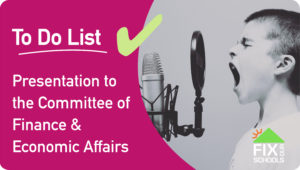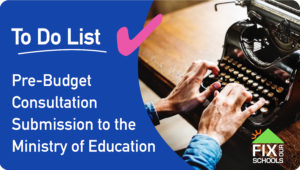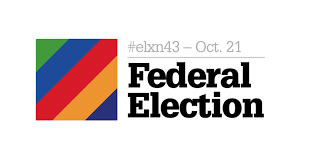Ontario’s provincial budget will be released on Thursday, November 5. This budget was originally planned for much earlier in the year but the COVID-19 pandemic has understandably delayed its release.
As a part of the pre-budget consultation conducted in early 2020, Fix Our Schools sent in this written submission to the Ministry of Education and made this presentation to the Committee of Finance and Economic Affairs. In both instances, Fix Our Schools made the following asks of Doug Ford’s provincial government:
1) Integrate the guiding principles of adequacy, affordability, equity, stability, flexibility, and accountability into your government’s approach to funding public education.
2) Develop a standard of good repair for all of Ontario’s publicly funded schools, which goes beyond logging disrepair to include issues such as: classroom temperatures, lead in water, air quality, washroom & lunchroom conditions; and fund this standard.
3) Commit the additional $1.6-billion/year investment required to eliminate the $16.3-billion of disrepair in Ontario’s publicly funded schools in the coming 7-8 years
4) Continue to collect school disrepair data; and resume the practice adopted by the previous Liberal government of publicly releasing annual updates on this school disrepair data; adding portables to this process.
5) Consider the 2-million children who spend their days in Ontario’s publicly funded school buildings in every decision and interaction you have relative to education. Schools are critical infrastructure that serve not only as places of learning but also places of work, places for daycare, and important community hubs. Your government is in the lead role for working collaboratively to develop the funding solutions needed to solve the massive problem of disrepair and poor conditions in Ontario’s schools.
 Once learning that Doug Ford’s government was planning to resume the budget process, Fix Our Schools resent our original submission, noting that the following urgent demands on school infrastructure (some of which have simply been highlighted by the COVID-19 pandemic, while others have been precipitated by it) must also be addressed by this upcoming budget:
Once learning that Doug Ford’s government was planning to resume the budget process, Fix Our Schools resent our original submission, noting that the following urgent demands on school infrastructure (some of which have simply been highlighted by the COVID-19 pandemic, while others have been precipitated by it) must also be addressed by this upcoming budget:
- HVAC and ventilation must be optimized in all classrooms
- Optimum indoor air quality and humidity must be optimized in all classrooms
- Technology that has been lent out by schools to accommodate at-home learning must be replaced for in-school learners
- Safe drinking water must be available in all schools, including First Nations schools
- Caretaking and operational maintenance must be increased to ensure soap dispensers are always filled, schools are as clean and sanitary as possible at all times, and that routine maintenance of schools that is done by caretakers can also be readily accomplished
Surprisingly, a few days after announcing that the provincial budget would be released November 5, Premier Ford and Education Minister Lecce announced that up to $700-million in funding for education-related projects, to be nominated and administered by the Ministry of Education. This funding is part of the federal government’s Investing in Canada Infrastructure Program, so Fix Our Schools is pleased to finally see federal funding released by the Ford government to be spent on school infrastructure. This new funding has been dubbed the “COVID-19 Resilience Infrastructure Stream: Education Related (CVRIS-EDU)”.
We know that good ventilation, physical distancing, and handwashing are all critical aspects of preventing the spread of COVID-19. Therefore, Fix Our Schools was pleased to see that CVRIS-EDU funding is intended to support retrofits, repairs, and upgrades to school board facilities to respond to the COVID-19 pandemic by supporting health and safety.
Fix Our Schools does have concerns that the provincial process for school boards to obtain access to this funding is expedient and streamlined. Similarly, we would like assurances that this funding will be distributed equitably between all 72 Ontario school boards. In reading the details issued by the government, there is nothing specified that would ensure any equity of distribution in this funding among Ontario’s school boards.


